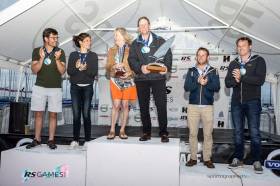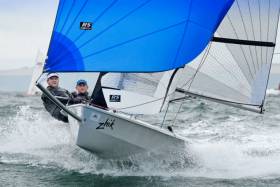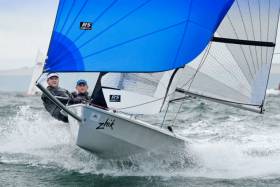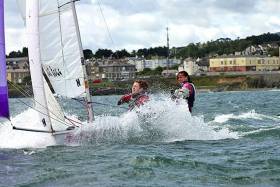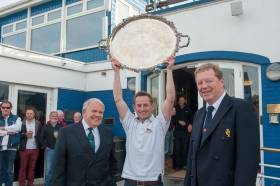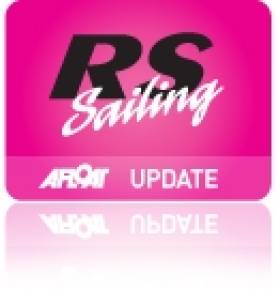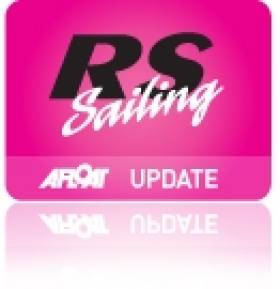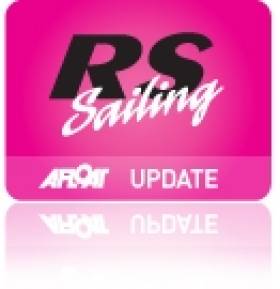Displaying items by tag: Alex Barry
Royal Cork's Alex Barry Launches 505 Worlds Campaign With Fourth at Euro Cup in Hayling Island
Royal Cork's Alex Barry is going quick in his new 505 campaign towards the World Championships in Cork Harbour next year.
The Irish dinghy ace is teamed up with Harry Briddon of the UK for a title at the 2022 title and is putting in some time this year training at Hayling Island, where last weekend's 505 Euro Cup competition included 49er Gold Medalist from Tokyo, Stuart Bithell.
After five races sailed in the 15-boat fleet, Barry ended up fourth overall, just two points behind Ian Pinnell and Tom Pickles of the host club in third position. Results are below.
The early boat speed looks promising for the Irish-English duo. Barry told Afloat he was 'flying' upwind, but he and Briddon still have some work on downwind technique.
The class looks forward to holding its 2022 World Championships in Cork from August 3 – 13th, 2022, where Barry is also an event organiser.
One hundred twenty crews from over 15 nations are expected for the 2022 championships. Eight or ten Irish boats will be among this number.
As Afloat previously reported, this will be the fourth time RCYC will have hosted the 505 World Championships, having welcomed visiting crews in 1959, 1964 and 1982.

Cork Harbour’s Barry & Leonard Third In RS400 Europeans
#RS400 - Alex Barry and Richard Leonard finished third in the RS400 Europeans at Weymouth this week.
The Cork Harbour duo completed an international podium, with Stewart and Sarah Robertson of Scotland taking the win and Francisco and Teresa Lobato of Portugal in second.
Sailing was very tight throughout the five days of racing for the 71-boat fleet, with Barry reporting that any one of five boats was capable of taking the event in the last race.
Notable entries included double Olympic silver medalist and Volvo Ocean Race winner Ian Walker, who was ninth overall.
Robbie O’Sullivan and Phil McGlade were the other Irish boat traveling, with a 33rd place finish in the Gold fleet. Full results are here.
The event was part of the wider RS anniversary games, which will see 2,000 sailors take to the water at the Weymouth and Portland National Sailing Academy by the end of this month.
Fourth For Barry & Leonard At RS400 UK Nationals
#RS400 - A solid fifth in the final race of the RS400 UK Nationals yesterday (Thursday 24 August) capped off a week that saw Alex Barry and Richard Leonard finish fourth overall.
The ultimate result was even more satisfying for the Royal Cork/Monkstown Bay pair as they were among the few boats to get ahead of potentially race-stopping sea breeze, one that opened a sizeable hole in the course on Mount’s Bay and left most of the fleet in confusion, as Yachts and Yachting reports.
It was also much consolation after a disappointing first race on the day — Barry and Leonard’s worst placing of the week at 29th but one that discards ensured wouldn’t blemish their final tally.
As predicted, John Gorringe and Oli Wells of Parkstone Yacht Club took the championship with a bullet in the very last race of the five-day event, though it wasn’t a sure thing after a seventh in Thursday’s first race took a chunk out of their lead and added to the pressure.
Meanwhile, three other Irish boats in the fleet showed strong performances in Cornwall this week.
Monkstown Bay’s John Downey and Sandy Rimmington were the highest placed Bronze fleet pairing at 11th overall, while Sean Cleary and Annalise Nixon of Oxford Sailing Club placed 24th and Robbie O’Sullivan and Phil McGlade, also of Monkstown Bay, finished 38th.
Cork Harbour Duo Barry & Leonard Going Strong At RS400 UK Nationals
#RS400 - It’s fifth place for Alex Barry and Richard Leonard after three days and six races at the RS400 UK Nationals in Cornwall.
The recent Southern Championship defending pair from the RCYC and Monkstown Bay on Cork Harbour scored a fourth and an 11th in racing on Mount’s Bay today (Wednesday 23 August), making their lighter set-up work despite the breeze.
Though the results saw them drop down a couple of places on the overall table, Barry and Leonard remain within touching distance of the championship currently within the grasp of John Gorringe and Oli Wells of Parkstone Yacht Club in Poole, who scored a pair of bullets to extend their lead.
Friendships Through RS Sailing Key To Future Of Dinghy Classes Says All Ireland Champ
#RS200 - Friendship is key to keeping Ireland’s youth dinghy sailing classes alive, according to this year’s All Ireland Champion sailor Alex Barry.
Speaking to Afloat.ie ahead of January’s RS200 open days at the Royal Cork Yacht Club, Barry laments that the numbers participating are “certainly not enough”.
While clubs and associations around Ireland are doing “a really good job” with junior classes since the ISA’s shake-up, and the high performance team has celebrated Olympic success, there remains “a void” for over-16s “who just want to have a bit of fun, go to a few events camping, and be with their friends.”
Barry points to the traditional route into sailing — and in particular the transition to bigger boats and team racing at university age, after starting in Optimists and skilling up in Lasers or Toppers — as the point where many young sailors drop out, prohibited by the significant investment, among other factors.
“My goal is to get the parents to reinvest that €4,000-€5,000 from [the sale of a Laser or Topper] into a 200, which can keep people sailing through that financially tough period,” says the Royal Cork member and RS400 champion.
“If they make it through that with a boat and maintaining the friendships, I believe the chances of them staying sailing are much greater, thus driving dinghy sailing forward.”
The first RS200 open days of the new year take place next weekend Saturday 7 and Sunday 8 January, with another weekend of open days to follow on 21-22 January. More details are available to download below.
Alex Barry is 'Sailor of the Month' (Inshore) for October
The 2016 ISA All-Ireland Championship in the first weekend of October was one of the closest-fought ever seen, with at least four helms in with a chance in the final stages on the second day, as a good sailing breeze settled in to banish memories of the morning’s frustrating calm.
The historic Crosshaven venue at the Royal Cork YC was appropriate to the concluding drama of the event, and the sense of something very special being under way was heightened by the boats of the day being the Ultra, the new Phil Morrison designed take on the classic National 18 design.
This is a class development in which the Royal Cork Yacht Club has played a generous supporting role, and while the boats were raced without use of spinnakers, nevertheless it provided a useful opportunity to showcase one of the most exciting recent developments in Irish dinghy racing.
As for the outcome, it was if anything too exciting, with all sorts of permutation in countback being required to declare who really was the overall winner after an entire raft of races for a fascinating selection of superstar sailors from a wide variety of boat backgrounds. But finally the nod was given to RS 400 champion Alex Barry, whom the Royal Cork can claim as one of their own, but he is also a leading member of Monkstown Bay SC further up the harbour.
Alex Barry is the Afloat.ie “Sailor of the Month (Inshore)” for October. And a year hence, he will be defending champion in the 70th Anniversary ISA All-Ireland Helmsman’s Championship, which already promises to be something truly historic.
#rssailing – Monkstown Bay Sailing Club's Alex Barry and Richard Leonard got the jump they needed when they won the final race of the RS400 Euro–cup in Carnac, France yesterday.
Two races were scheduled for the final day of the Cup. With First gun at 10:30 and no warning signal allowed passed 13:00, it was a tight window.
One race was eventually sailed in 5 – 8 knots from the North and glorious sunshine.
The Cork harbour pair lead the race from start to finish and with their closest competitors having a poor race it meant they moved up to third overall and a prized podium finish.
The race for the overall title was extremely tight with Jim Downer and Jono Price from Cowes winning on count back.
Results downloadable below.
Additional report from David Rose below:
Excellent race management, in mixed conditions over four days, made for a brilliant RS Eurocup in Carnac at the weekend for the large RS fleets competing. The RS400 had the largest, and one of the most competitive fleets with 31 entries.
Emmet Ryan, who had travelled to a well-attended Garda event last season, and was coming off the back of a 3rd place at a very competitive Irish Eastern Champs with brother James, commented that the standard at this year's European adventure was every bit as high as the top class racing he had experienced in the Italian mountains twelve months earlier. Like at that event, Emmet started really strongly, and was best of the Irish with two 8th place finishes on day one. The Ryan's were to remain consistent for the rest of the regatta, never really hitting the dizzy heights they are capable of, apart from one 5th place. They were extremely consistent with only one race outside the top 10, and will no doubt be competing for honours in Ireland all season.
Day two involved a good deal more hiking, with plaining conditions and 3 longer than usual races. When the sweat settled, Alex Barry and Richard Leonard had put in a great shift and brought themselves back in touch with the top end of the fleet after an average first day, with a 6, 3, 1. This form was to continue for another two days, with two races sailed on day 3 and one on day 4. In the final race Alex / Richard were to lead at every mark and record a second bullet in the event. This mercurial team from MBSC/RCYC, who have become accustomed to the winning circle at the Irish events just kept reeling in and passing competitors on the score board, akin to Rory Mac on birdie charge. They were to run out of races in 3rd position, a brilliant result for them, their clubs MBSC and RCYC and for Ireland.
Paul Mc Laughlin and his crew and only lady to travel Michael Mc Minkey performed admirably and finished up in 14th place, followed by Robert O' Sullivan and David Whitaker who faired particularly well on day one, and were to finish 19th. 'Uncle' Liam Donnelly and his crew Richard Mc Caid came in a respectable 22nd overall.
The Irish RS400 fleets was well represented by the following teams in order of their finishing places:
3rd - Alex Barry & Richard Leonard MBSC / RCYC
11th – Emmet Ryan & James Ryan RSTGYC
14th – Paul Mc Laughlin & Michael Mc Minkey
19th – Robert O' Sullivan & David Whitaker MBSC / RCYC
22nd – Liam Donnelly and Richard Mc Caid RNIYC
#RS400 – After seven races sailed at the RS400 Cup in Carnac, France, Cork Harbour pair Alex Barry and Richard from Leonard from Monkstown Bay Sailing Club stay fourth after counting a three and a six in yesterday's two 15-knot races.
Two more races to complete the series are scheduled for this morning but with a first gun at 10:30 and the breeze typically not arriving in the Bay of Quiberon before 1300 all week there is a question mark over whether a full programme being can be sailed. No race can start after 13:00 today but if racing takes place a second discard applies.
#rssailing – There was a buzz in the Monkstown Bay SC dinghy park last Saturday morning writes David Rose. There was a real feeling of a fresh start for dinghy sailing in this part of the world, with 20 boats hitting the start line and many new teams competing for the first or second time in the Feva, RS200 and RS400 classes alongside seasoned campaigners. Overall results are available to download below.
There were some nerves and a lot of smiling faces as the teams got through the formalities of rigging and entering, which included a barbecue later that day to replenish the energy spent on the water.
It was clear from the forecast and the talk in the dinghy park that it was going to be a day full of exertion, with an 8 race program to be run over one day. This format is designed to be just as competitive as regional events, but with an emphasis on getting as much sailing in as possible allowing crews to improve their performance. General recalls and protests don't come into it, it's all about the sailing, which makes for a very enjoyable and productive outing for all.
Monkstown was out in strength with a small army of volunteers ensuring that everything was running smoothly and it was.
Racing got underway in glorious conditions, with gusts coming down a sunny racecourse packed with boats. The spectacle was fantastic, and a local sailor viewing from a spectator boat commented to me afterwards that we could have charged for tickets, the racing was so good to watch, with boats flying into the leeward gate from every angle at high speeds.
The race team provided rapid fire 3,2,1 go races with minimal delays, and 8 races were sailed over a long but exhilarating day. Many teams were feeling exhausted when they hit the dock, with some people asking their fellow competitors for help pulling their boats out of the water after giving their all to the racing.
The energy and enthusiasm for the sport was palpable ashore, with crews beaming from ear to ear and telling each other just how wrecked they felt. There was a superb atmosphere in the bar afterwards and it seemed fitting that Alex Barry who had organised the event took the honours in the RS400 class with Paul O'Sullivan crewing, followed by another impressive local performance from John Downey and Sandy Rimmington.
The 200's were won by Trevor Fisher and Heather King who showed great support for the class by making the trip to Cork so soon after a sprint in NI.
The Feva's were won by Cork sailors Harry Durcan and Peter Hyland of the RCYC.
Onwards and upwards for this group of classes. I feel we could get another few new joiners from the success of this non ranking sprint event alone. Many people waxed lyrical about how enjoyable and challenging these two handed boats are to sail.
The next outing is the Northerns, followed by the Westerns and then Riva Del Garda in Italy and a Nationals in Galway before returning to the South for a Kinsale southerns. This is an action packed circuit.
Thanks to OOD Ciarán McSweeney, sponsors the Bosun Bar & Guesthouse and Ramen - "Asian Street Food" and most importantly the army of volunteers from Monkstown Bay who put on an amazing event and fed all of the sailors with a BBQ after etc.


























